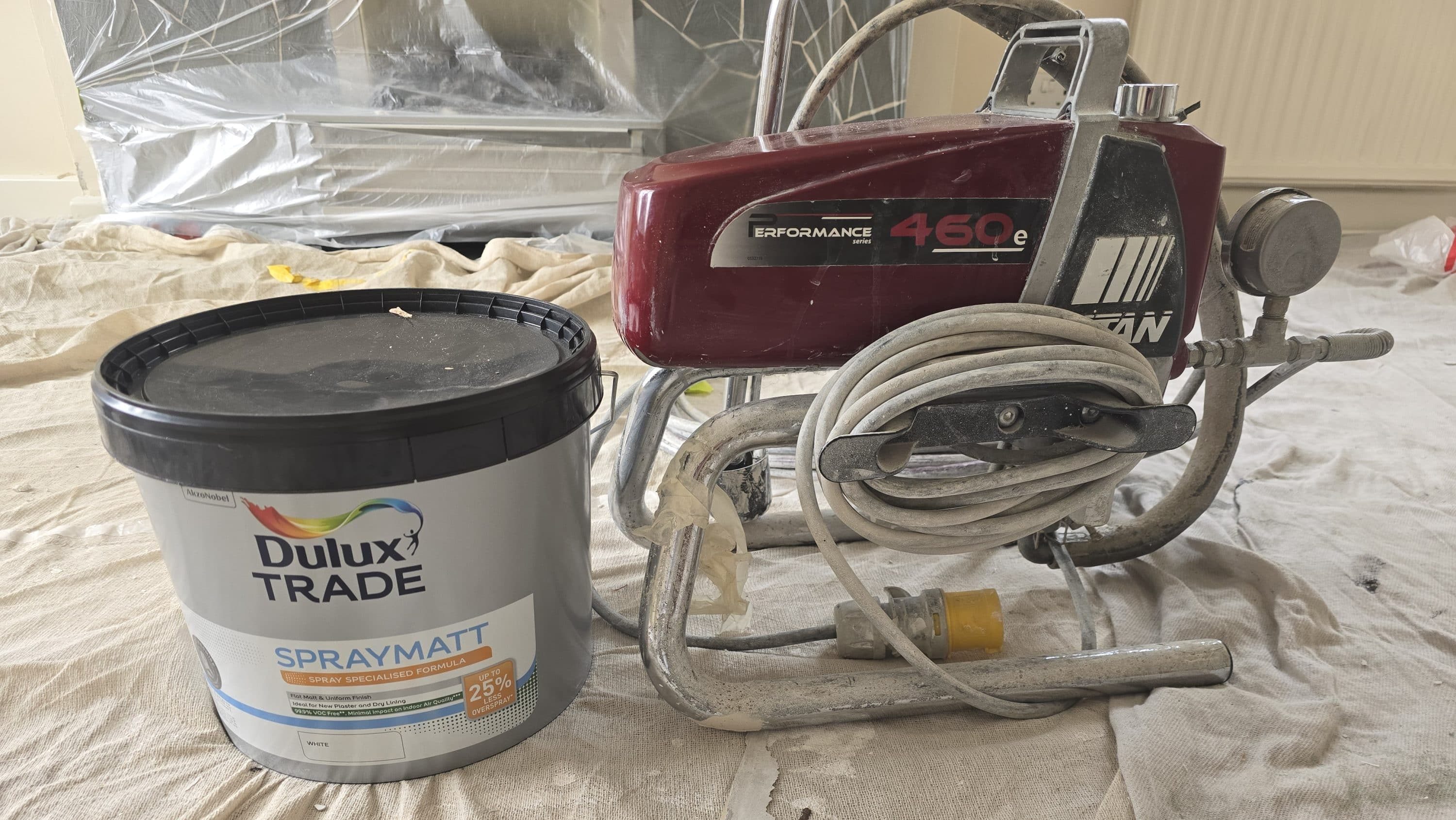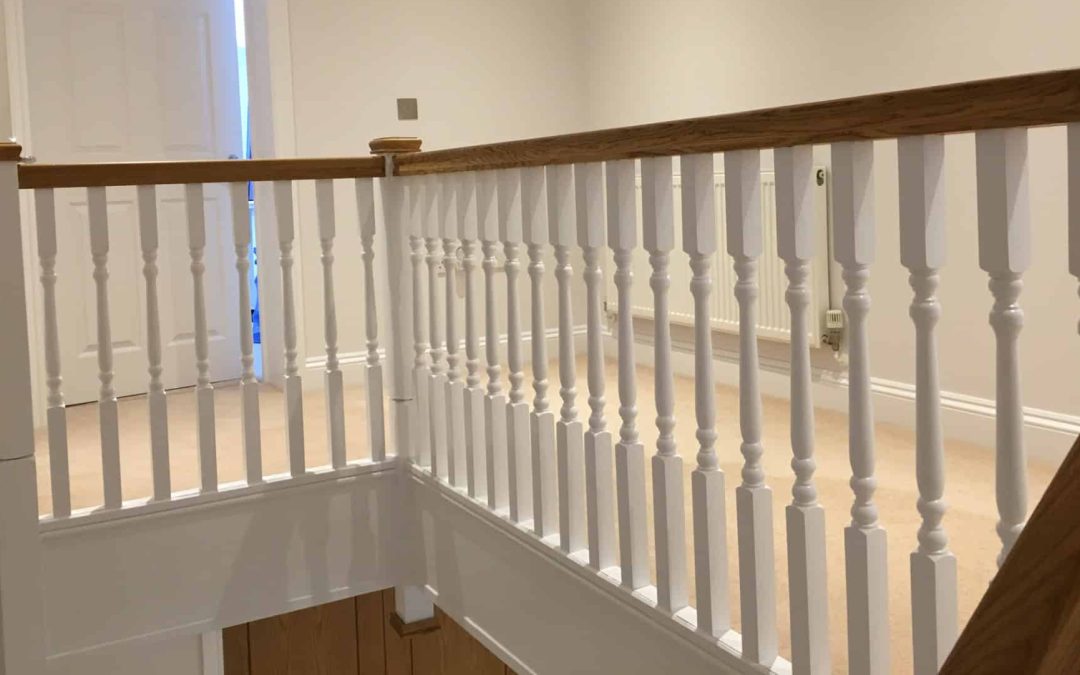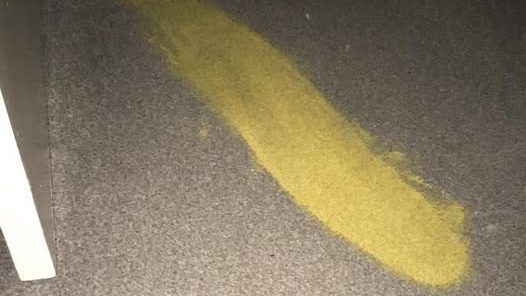Spray painting has been an area of enormous growth within the decorating industry in recent years. Not so long ago, spray painting was mostly carried out in commercial and industrial settings, where huge areas needed to be painted, making the use of a brush and roller impractical.
However, the combination of the flawless finish and the significant improvements in time/efficiency have made spraying attractive in domestic settings too, and now that quality masking materials are so readily available there really is no reason not to give spraying a go.
In this blog and accompanying video we’ll talk you through how to go about spray painting a ceiling. We’ll go step-by-step through the process, look at the benefits of spraying, and look at some of the reasons why people don’t get into spraying (and suggest how to overcome these issues).
This blog is a “joint production” by two experienced professional decorators – Mike Cupit has created the accompanying video, and I, Robin Gofton, am writing the text. You’ll find watching the video is really helpful, because you can see the spray machine in use, and some things are better explained by seeing the job done, rather than in text. Feel free to skip ahead if you don’t need all the information on offer.
Why Spray Paint a Ceiling? Pros of spraying vs brush and roller:
Speed and efficiency
As Mike demonstrates in the accompanying video, if you have a completely empty room you can sheet up, set up your sprayer and have two coats done incredibly quickly.
Obviously spraying is ideal in new build properties and larger rooms, but even in some smaller rooms spraying is still worthwhile for the better finish, and can still be quicker (there must be some scientific formula to work out the size of room at which spraying becomes worthwhile, but I’m afraid I don’t know it!)
Smoother, more even coverage
Absolutely no risk of brush or roller marks when you spray; you can get as near to a perfect finish as you can imagine.
Why Some People Don’t Spray their Ceilings
Mess and overspray
I really don’t get this as an objection. If you were rolling your ceiling you’d sheet up anyway, and mask things like doors, light fitting, windows and fireplaces. Any mess will fall on the dustsheets, which is what they’re there for. And if you set your spray machine up correctly, have a good technique and use the right paint (diluted to the right ratio), there’s surprisingly little overspray
Equipment costs
Sure, buying a new airless set-up is expensive, but if you’re new to spraying and just want to try it to see how you get on, you can hire one from Airblast Eurospray Direct. They’re experts in the field, will be able to give you all the help and advice you need, and will even drop off and pick up the machine for you. Click here for more information.
Lack of knowledge / understanding / experience
Of course, if you’ve never sprayed before, it can seem a bit daunting. But help is at hand. Dulux Academies run “Introduction to Spraying” courses. I’ve been on one myself, and can’t recommend them highly enough. There are Dulux Academy sites across the UK – one at their head office in Slough, some in Dulux Decorator centres, and others in local colleges – just Google “Dulux Academy” and find a site near you. An introductory course will only cost a couple of hundred pounds and is well worth it if you’re new to spraying. Click here for more information.
Prep time
I’ve heard the argument that “By the time you’ve masked everything up, I could have rolled the ceiling”. Maybe you could, but surely if you’re painting with a brush and roller you need to put dust sheets down and mask up things like wooden doors, fireplaces etc? The only real additional “prep” time is actually in setting up, and cleaning the spray machine, which is probably about half an hour in total.
Ventilation/health concerns
This is a valid point, as you don’t want to be breathing in micro-droplets of paint. But a small investment in a decent mask will overcome this issue.
Tools and Materials Needed for Spray Painting a Ceiling
- Airless spray set-up – as mentioned already, you can hire one from Airblast Eurospray Direct. Suitable spray tips and extension wands as required.
- Dust sheets, plastic sheeting and masking tape.
- PPE – mask definitely, goggles probably.
- Suitable ceiling paint (more on this later).
- Paint mixer.
- Bucket of clean water.
How to Spray Paint a Ceiling – Step-by-Step Guide
Prep the room
Remove all ornaments and as much furniture as possible. When you’re spraying a ceiling, your eyes are on the ceiling, and you don’t want to be bumping into or tripping over obstacles. Cover the floors (and any furniture which can’t be removed) with dust sheets. Mask up features such as fireplaces, light fittings (if they can’t be removed), windows, doors etc with masking film and tape.

Prep the spray machine and paint
Make sure the machine is set up correctly and clean, with the right tip fitted etc. Every machine will be slightly different, so make sure you carefully follow the instructions on the machine you are using. Dilute the paint as necessary. Mixing the paint with a mechanical whisk helps, but if you don’t have one of those, a thorough mix with a stick will do.
Have a test spray on a sheet of cardboard (or the walls if they’re going to be painted as part of the project) to make sure you’re happy with the spray pattern/fan width.

Prep yourself
Put on your PPE. Wear googles and a mask.
Apply the first coat
The video (below) will explain this much better than reading my prose, but remember to:
- Not press the trigger on the spray gun unless your hand is moving (otherwise you will end up with too much paint being sprayed onto one small area).
- Overlap your passes by about 50% for a really even coverage.
- Keep the gun a constant distance from the ceiling and avoid “arching”; this would result in inconsistent coverage and a lot more overspray (the accompanying video demonstrates this perfectly).
Apply the second coat
Use the same technique as the first coat. You won’t need to wait anything like as long between coats as you would if you were working with a brush and roller, because the sprayer applies a very thin, even layer. It is even possible to spray “wet on wet”, which of course would not be possible with a roller.
Clean-Up
Clean the spray machine immediately after use, following the manufacturer’s instructions. Carefully remove masking tape and film, and clear away all your tools, paint and dust sheets (unless needed later, for example if the walls are being painted).
A Video Demo
How to Spray Paint a Ceiling
A quick video on how to spray paint a ceiling, including a product recommendation and a couple of useful resources.
Best Paint for Spraying a Ceiling
These days there are loads of really good quality paints around designed specifically for ceilings. These often give a very flat matt finish, which is not only a very contemporary look, but it also helps to hide any blemishes or imperfections in the ceiling.
Most of these are suitable for spraying, and indeed many of them have specific instructions on the back on how to set up your spray machine for use with that particular paint.
Dulux Trade SprayMatt is actually designed for this job. Not only does it give a lovely flat matt finish, but because it was developed specifically for airless spray use, they have found a way to significantly reduce the amount of overspray, so there’s less paint in the atmosphere when you’re working, and less wastage.
It is a contract matt, so it won’t stand up to a lot of cleaning, but if you’re not planning to be mopping the ceiling regularly (?!), this is an ideal paint for the job.

Final Thoughts
Spray painting your ceiling can give you an amazing flawless finish in surprisingly little time. However, if you’re new to spraying I totally understand that it feels a little daunting. The best advice I can give you is to book yourself on a course at the Dulux Academy and then hire a spray set-up for the first project you plan to spray, so you can try it out without the up-front investment cost of buying a machine yourself.
FAQs
What’s the best tip to spray ceilings with?
We mostly use a 517 tip when spraying ceilings, but we cut down to 515 when we need to be a little more controlled.
Is it better to roll or spray a ceiling?
There are a few factors to consider, but generally speaking, if you have a nice clear room, it’s better to spray a ceiling than it is to roll it.
How to prep a room for spray painting a ceiling?
Remove all the furniture, cover windows, switches, light fittings etc, along with the floor. Then fill and sand everything you intend to paint (as you would if you were painting with a brush and roller).
What type of sprayer should you use to paint a ceiling?
A good-quality airless sprayer is ideal for painting ceilings.













































0 Comments